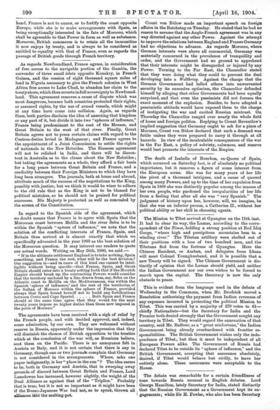As regards Newfoundland, France agrees, in consideration of free access
to the navigable portion of the Gambia, the surrender of three small islets opposite Konakry, in French Guinea, and the cession of eight thousand square miles of land in Nigeria necessary to give the French colonies in West Africa free access to Lake Chad, to abandon her claim to the treaty shore, which thus reverts infull sovereignty to Newfound- land. This agreement removes a cause of dispute which was most dangerous, because both countries protected their rights, or assumed rights, by the use of armed vessels, which might at any time have come into collision. Again, as regards Siam, both parties disclaim the idea of annexing that kingdom or any part of it, but divide it into two "spheres of influence," France being predominant to the east of the Menem, and Great Britain to the west of that river. Finally, Great Britain agrees not to press certain claims with regard to the Custom-duties levied in Madagascar ; and France agrees to the appointment of a Joint Commission to settle the rights of nationals in the New Hebrides. The Siamese agreement will not be relished in India, and there will be discon- tent in Australia as to the clause about the New Hebrides ; but taking the agreements as a whole, they afford a fair basis for a long peace between Great Britain and France, and a cordiality between their Foreign Ministers to which they have long been strangers. The journals, both at home and abroad, attribute much of the success of the negotiations to the King, possibly with justice; but we think it would be wiser to adhere to the old rule that as the King is not to be blamed for political mistakes, so he should not be praised for political successes. His Majesty is protected as well as concealed by the screen of the Constitution.
In regard to the Spanish side of the agreement, which no doubt means that France is to agree with Spain that the Moroccan coast between Melilla and the river Sebu is to be Within the Spanish" sphere of influence," we note that the solution of the conflicting interests of France, Spain, and Britain thus arrived at is almost exactly that which we specifically advocated in the year 1900 as the best solution of the Moroccan question. It may interest our readers to quote our actual words. Writing on May 26th, 1900, we said
"If in the ultimate settlement England is to take nothing, Spain something, and France the rest, what will be the best division Our suggestion is—and in cases of this kind one cannot be intel- ligible without being specific—that France. Spain, and Great Britain should enter into a treaty setting forth that if the Moorish Empire should break up, the contracting Powers would consider that the territory enclosed by a line drawn from, say, Sebu on the Atlantic coast to Melilla on the Mediterranean, was within the Spanish 'sphere of influence,' and the rest of the territories of the Sultan of Morocco within the sphere of France, provided always that Spain bound herself not to build any fortifications between Ceuta and Cape Spartel. . . . . . Both Spain and France should at the same time agree that they would for the next twenty years impose no higher duties than those now imposed in the ports of Morocco."
The death of Isabella of Bourbon, ex-Queen of Spain, which occurred on Saturday last, is of absolutely no political Importance, but it removes a figure of some interest from the European scene. She was for many years of her life the pivot of a thousand intrigues, and a cause of quarrel among many Powers, and up to the time of her expulsion from Spain in 1868 she was distinctly popular among the masses of her own people, who pardoned the irregularities of her life from a feeling that after all she was "very Spanish." The judgment of history upon her, however, will, we imagine, be that she was an inferior person, a Catherine IL, without her political ability or her skill in choosing agents.
The Mission to Tibet arrived at Gyangtee on the 11th inst. It had to clear its way, the Lamas, according to the corre- spondent of the Times, holding a strong position at Red Idol Gorge, "where high and precipitous mountains hem in a winding river." The Tibetan artillery were shelled out of their positions with a loss of two hundred men, and the Tibetans fled from the fortress of Gyangtse. Here the Chinese Resident, or Amban, and delegates from Lhasa will meet Colonel Younghusband, and it is possible that a new Treaty will be signed. The Chinese Government is dis- tinctly of opinion that the Lamas should yield, and neither the Indian Government nor our own wishes to be forced to march upon the capitaL The theocracy is now the only obstacle to peace.






































 Previous page
Previous page